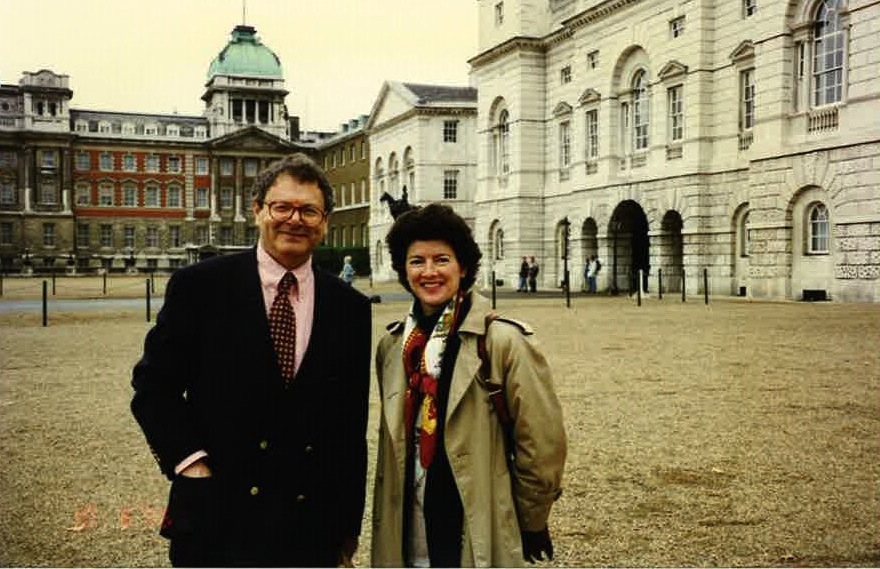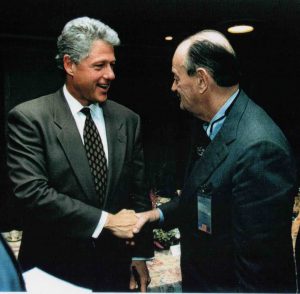
Churchill’s Biographers: Manchester vs. Gilbert
Q: How to they differ?
I’ve been slogging through the William Manchester Churchill trilogy, The Last Lion. How is Hillsdale’s eight volume Winston S. Churchill by Randolph Churchill and Martin Gilbert different? —M.A., Louisiana.
A: Profoundly, but both are invaluable
(This article is excerpted from a longer piece which can read in entirety on the Hillsdale College Churchill Project.) If you are slogging through Manchester, you may find Gilbert a challenge. There is a vast difference, both writers have their advantages, but Gilbert is the source on which scholars rely.
Music by Churchill, Lyrics by Manchester

William Manchester was a stylist, a lyrical, beautiful writer. But comparing him to Gilbert, Simon Schama was critical: “Manchester’s slapdash study, with its cartoon-strip account of British politics and culture and its rhinestone-studded prose, looked particularly gaudy next to Gilbert’s.”
But let’s remember the good: William Manchester in the 1980s brought more people to Churchill than anyone at that time. Accomplished scholars who took great issue with his conclusions were often careful to credit him with that.
Manchester’s epic prologues to Volumes 1 and 2 of The Last Lion are literary works of art. For a fine analysis of how Manchester weaves his prologues, see Cole Feix, “Churchill’s Character,” on the Hillsdale Churchill website. (Volume 3, written by WM’s friend Paul Reid, is more analytical). The problem was that Manchester tended to make many detail errors, and sometimes his footnotes lead in circles, or nowhere.
Churchillians hosted Manchester at several events beginning in 1986. After I published a respectful review of his volume 1, noting many errors, he hired me to vet volume 2. I found 600 nits to pick, and he did not correct them all! For instance, his account of the crucial East Fulham bi-election of 1933 treats the vote as a Labour upset which pushed the Tories toward appeasing Hitler. In fact, East Fulham was a marginal factor.
Gilbert as Bard
Randolph Churchill, who wrote the first two volumes of the official biography, could be in parts as lyrical as Manchester, but he too made mistakes and omissions. A contemporary historian called those volumes “the case for the defense,” complaining that Churchill himself had already published his defenses through his memoirs of the two World Wars.
Martin Gilbert is virtually error-free, and very different. His is a chronological, day by day account, which puts you at Churchill’s shoulder as events unfold. Gilbert refrains from expressing his opinion, but reviewers make too much of this. His opinion is clear through his selection of material. It is mainly positive, but he does not overlook Churchill’s faults.
Together with the accompanying document volumes (twenty-three, since Hillsdale finished the job in 2019)—it is unsurpassed. A very fine review of Gilbert was by Professor Schama in 1983. It concerns Volume 6, but really applies to all the Gilbert volumes (3-8).
Schama on the “Churchilliad”
From Simon Schama’s review of Winston S. Churchill, volume 6, Finest Hour 1941-1945, in The New Republic, 1983:
The narrative simply begins: “At eleven o’clock on the morning of September 3rd 1939…” and goes on like that for another 1274 pages. It is a Churchilliad, and Gilbert is its Bard….
The great tidal wave of detail plunges the reader almost involuntarily into Churchill’s life during the first two grim years of the war. One does not so much read the life, one accompanies it….
There are unforgettable vignettes: receiving an assistant during the Blitz “wrapped only in a huge bath towel looking like one of the later Roman Emperors”: singing “Ol’ Man River” in his car after speaking in Parliament of the Anglo-American relationship that “like the Mississippi just keeps rolling along”; rapping on a front door and greeting the butler with a cheery “Goebbels and Goering here to report”; and dictating to his secretary from his flower-chintzed four-poster, chewing a cigar, sipping soda water and fidgeting his toes beneath the bedclothes….
“Like a Great Granite Cliff”
Against all odds, [Gilbert] succeeds in conveying the frightening bleakness of the spring of 1940, when Hitler seemed unstoppable and European democracy appeared to be closing down for the season. The first indispensable component of Churchill’s leadership was staggeringly and indefatigably hard work….more than any of the other war leaders, and certainly more than either Stalin or the warlords in Berlin and Rome, Churchill was in his own right a great commander. This is not to say that he did not commit blunders during the war. But he had an unerring nose for fine commanders, and he stuck by them even when they were drawing flack from their staff….
The terror of imminent extinction flickers intermittently through Martin Gilbert’s crowded narrative. But whenever it begins to rise with the tempo of accumulating disasters, Churchill’s presence, too, rises above the panic, like a great granite cliff.
I suppose that is what our forebears felt and what sustained them in the nightmare of 1940. This is a rare thing then: a vast biography in which the stature of its subject is enhanced rather than diminished with every page and every document. The only somber reflection on putting it down is the certainty that we shall not look upon his like again.
Further reading
“Gilbert and Manchester: Complementary Biographers,” 2012







2 thoughts on “Churchill’s Biographers: Manchester vs. Gilbert”
I remember querying Bill Manchester about that when I read the proofs. No luck! Manchester had a prurient streak and was given to rumors of sexual escapades. The Castlerosse nonsense had been circulating since the late 1930s, and he bought it. See “Too Easy to be Good: The Churchill Marriage and Lady Castlerosse.”
One reason why Andrew Roberts’ new book is the best single-volume Churchill biography is his routine dismissal of tall tales as he goes along. They fall like ten pins. See “No Cutlet Uncooked: Andrew Roberts’ Superb Churchill Biography.”
I’ve just begun reading the second volume of Manchester’s biography and I must say I have come across a grievous error already. Manchester confirms the Lady Castlerosse affair. He calls her a titled Englishwoman but it is amply clear who that woman is. Which is quite disappointing given the fact that this to quote Andrew Roberts “is all bilge.” One wonders what led him to print such a thing ?
Comments are closed.